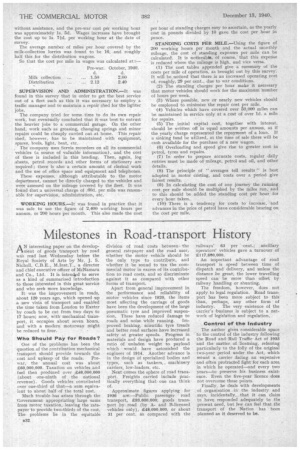Milestones in Road-transport History
Page 38

If you've noticed an error in this article please click here to report it so we can fix it.
AN interesting paper on the development of goods transport by road was read last Wednesday before the Royal Society of Arts by Mr. J. S. Nicholl, C.B.E., M.Inst.T., a director and chief executive officer of McNamara and Co., Ltd. It is intended to serve as a kind of summarized introduction to those interested in this great service and who seek more knowledge.
It was the improvement in roads, about 120 years ago, which opened up a new vista of transport and enabled the time taken from London to Exeter by coach to be cut from two days to 17 hours; now, with mechanical transport, it occupies about seven hews, and with a modern motorway might be reduced to four, Who Should Pay for Roads?
One of the problems has been the question of the eontribution mechanical transport should provide towards the
cost and upkeep of the roads. Prewar, the annual cost was about £60,000,000. Taxation on vehicles. and fuel then produced over 288,000,000 (about one-ninth of the national revenue). Goods vehicles contributed over one-third of that—a sum equivalent to about half of the total cost.
Much trouble has arisen through the 'Government appropriating large sums from motor taxation, leaving the ratepayer-to provide two-thirds of the cost. The problems lie in the equitable
B32 division of road costs between • the general ratepayer and the road user, whether the motor vehicle should be the only type to contribute, and whether it be sound to tax the commercial motor in excess of its contribution to road costs, and so discriminate against it as compared with other forms of transport.
Apart from general improvement in the performance' and reliability of motor vehicles since 1920, the items most affecting the carriage of goods have been the development of the large pneumatic tyre and improved suspension. These have reduced damage to
roads and noise while running. Improved braking, scientific tyre treads and better road surfaces have increased safety at greater speeds. Progress in materials and design have produced a ratio of unladen weight to payload which would have astonished the engineer of 1914. Another advance is in the design Of specialized bodies and types, such as tankers„ machinery carriers, low-loaders, etc.
Next comes the sphere of road transport. Freights carried include practically everything that one can think of.
Approximate figures applying for 1936 are:—Public passenger road transport, £93,600,000; goods transport by road (by Aand B-licensed vehicles only), £48,000,000, or about 31 per cent. as compared with the
railways' 63 per --cent.; ancillary operators' vehicles gave a turnover of £117,00,000.
An important advantage of road transport is speed between time of dispatch and delivery, and unless the distance be great, the lower travelling speed can be more than offset by railway handling or shunting.
The freedom, however, does not apply to legal regulation. Road transport has been more subject to this than, perhaps, any other form of industry. The very existence of the carrier's business is subject to a network of legislation and regulation. • Control of the industry The author gives considerable space to the control of the industry following the Road and•Rail Traffic Act of 1933 and the matter of licensing, referring particularly to the folly of the original two-year period under the Act, which meant a carrier facing an expensive and often protracted fight for each area in which he operated—and every two years—to preserve his business existence. Even the five-year licence does not overcome these points.
Finally, he deals with developments of organization in the industry and says, incidentally, that it can claim to have responded adequately to the present need, but few can feel that the transport of the Nation has been planned as it deserved to be.




























































